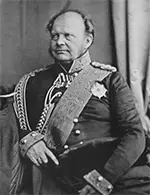Frederick William IV: King of Prussia
Frederick William IV was King of Prussia for more than two decades in the 19th Century. 
He was born on Oct. 15, 1795, in Kronprinzelpalis, in Berlin. His father was the King of Prussia Frederick William III, and his mother was Louise of Mecklenburg-Strelitz. As the oldest son, young Frederick William was expected to succeed his father, and so the boy learned from a serious of private tutors and also fought in the Prussian Army, fighting against France in the War of the Sixth Coalition. On Nov. 29, 1829, Frederick William married Elisabeth Ludovika of Bavaria. They were a happy couple but had no children. King Frederick William III died on June 7, 1840, and his son succeeded him as king. He had had an early interest in architecture and, as king, pursued that interest, encouraging the construction of the Old National Gallery and the Neues Museum and the enhancement of Cologne Cathedral. He also gave away his father's personal animal collection to the Berlin Zoo, which opened in 1844, the first in the country. In 1848, revolutions convulsed a number of European countries. Dramatic changes occurred in Austria and France. In March of that year, large crowds gathered in Berlin and made demands of the Prussian king. Among those demands were a constitution, parliamentary elections, and freedom of the press. The king agreed, but subsequent clashes between demonstrators and soldiers resulted in deaths and a wholesale battle ensued in the streets of Berlin. After a few days, the fighting stopped. The king made a show of marching through the streets to attend a funeral for those killed in the fighting. Next came an elected government, the Constitutional National Assembly, also known as the Frankfurt Parliament, which had members from a number of German states. Set with the unenviable task of passing laws that would benefit all of the myriad German states, the assembly failed to generate any legislation. That assembly was dissolved, and another one, the Berlin Assembly, took its place. In December, however, the king broke up the assembly and declared a constitutional monarchy headed by a parliamentary government. Elected as the first head of the new parliament was Otto von Bismarck. Frederick William had hoped that he could emulate his predecessors and become a new form of overlord, going so far as to declare the Erfurt Union, a joining of German states (other than Austria) in a sort of federation, over which he would preside. The desire for that kind of thing had waned, and so the king accepted his position at the head of a representative government. Also during this time, Prussian forces fought a war for control of the Duchies of Holstein, Lauenburg, and Schleswig. All three were filled with German-speaking people, but control was disputed between Denmark and Prussia. Holstein and Lauenburg were members of the German Confederation (but Schleswig was not); and so when a large number of people in those two duchies began in uprising in 1848, the Confederation gave its tacit support, supplying troops, the majority of which came from Prussia. Frederick VII was King of Denmark at that time, and he also was the duke of the three lands in revolt. He also had the support of other European powers, notably Russia and the United Kingdom. Austria refused to get involved, leaving Prussia to fight alone. Denmark and Prussia fought a series of battles, from April through June. Denmark gained the upper hand, and Prussia agreed to meet nearly all of Denmark's demands. That agreement was the precursor to a more wide-ranging conference, at which negotiations deteriorated and resulted in an end to the truce. Fighting renewed in 1849 and again lasted into the summer months. Danish victories again brought about a truce, which lasted nearly a year. Fighting resumed in 1850 and continued off and on during that year. An international treaty, the London Protocol, in 1852 ended the fighting for good. Various accounts list the conflict as the First Schleswig War, the Schleswig-Holstein War, and the Three Years' War. A number of strokes, beginning in July 1857, increasingly debilitated the king. His brother William began serving as regent on Oct. 7, 1858, and became king when Frederick William died, on Jan. 2, 1861. |
|
Social Studies for Kids
copyright 2002–2024
David White




